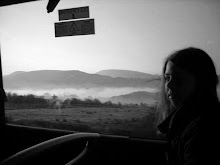The best way to see this country is on a Greyhound Bus. I boarded one early in the morning in Chicago, rode it through the South Side and looked out at the streets, the power lines, the houses, if you can call them that. Boarded up businesses, broken down cars, little kids walking to school. Tired quiet people waiting for their trains to come, still at the station with lanes of traffic blurring past on either side. We picked up two kids at Dan Ryan and 95th, they headed toward the back rows, pulling up their pants. They fell asleep almost immediately, sprawled out across the seats with their legs in the aisle. The man across from me told his story, though no one had asked him. His daughter had nearly been killed in a crash with a semi, she was clinging to life in Indianapolis. He'd nearly reached Omaha when he got the news, turned his own semi around and grabbed the first Greyhound home to Indiana. He lapsed into the details of the trucking world, I turned my head toward the window.
I could see the city fly past, the parts no one ever takes time to look at, the most interesting parts. I could see the face of the man in front of me reflected in the window, dark eyelashes and calm skin, and we watched the world and pondered our separate thoughts. Then he began to cry, and at first I wondered if he was crying for the neighborhoods, for the people who used to live here and work in meat packing plants, for the people who live here and have no jobs, for the babies crying and the old people dying. It was finally summer, and things were green, but this part of town would look better in winter, more in place with the sooty snow and grey skies than under the hazy May sun. He cried all the way to Calumet, sobs that shook his large shoulders. He covered his mouth with his hands and faced forward, his reflection gone from the window. I sat in silence and turned my music down, out of respect. I wanted to tell him to keep his lip stiff, keep his fists clenched, that sometimes you gotta kick your way through this bitch. But I couldn't say it like Brother Ali.
The truck driver was repeating his story to another uninterested listener, giving the gory details of the way they found his daughter with all four limbs broken. Nearly everyone else was out, the blacktop singing them to sleep. In Calumet a family got on. They talked in Spanish, too fast for me to understand, and their voices hurt my ears. They talked about Chicago, and I looked back down the highway toward the city we had left behind. Indiana welcomed us with black smoke blocking out the sunshine. Downtown Gary, likely the saddest city in America, was void of life and grim. The weeds and smog seem to choke out all happiness. Then the rain came. It didn't let up until we got to Indianapolis. Behind me I heard someone ask "Estamos en Chicago?" After much confusion the Spanish-speaking family realized that they were not on the bus to Chicago, that they were now miles away from their destination. They were silent for a while, as the feeling of lostness settled in.
In Indianapolis I sat on the church pew benches of the station and ate my lunch. I read. I waited. A florescent light buzzed. An old man in a hat offered me a religious flier. I shook my head. I didn't need to find God. I went back to my book, passing the time til I made it to Cincinnati, wondering just what this thing they call the Midwest really is.
Tuesday, April 21, 2009
Subscribe to:
Posts (Atom)
